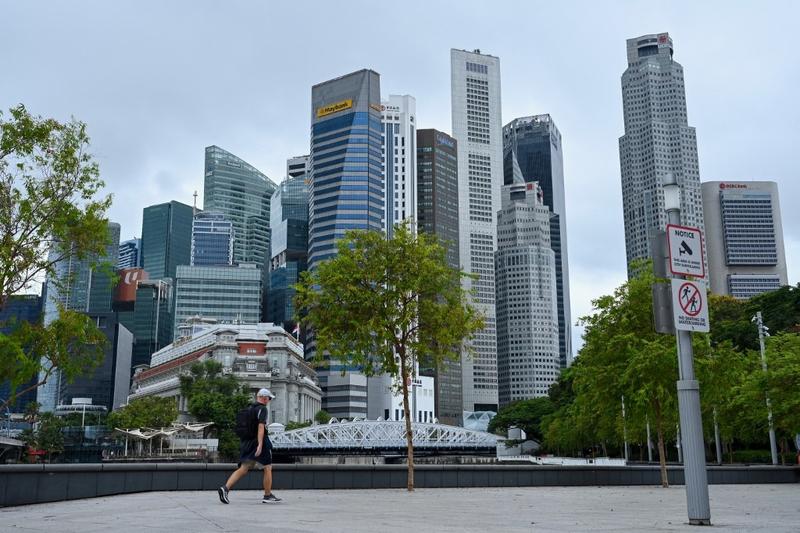Analysts hope eased COVID-19 restrictions will quickly restore city-state’s energy as a regional hub
 A man walks through a park next to financial business district in Singapore on April 7, 2022. (ROSLAN RAHMAN / AFP)
A man walks through a park next to financial business district in Singapore on April 7, 2022. (ROSLAN RAHMAN / AFP)
Singapore is set to reestablish itself as one of the world’s key business and travel hubs as the city-state moved to ease most COVID-19 restrictions and allow entry for all vaccinated travelers from April 1.
Analysts expect that reopening borders and relaxing social distancing rules will help sustain Singapore’s recovery. The Southeast Asian country has long relied on international trade and travel networks to support its economy, and the government has forecast 3 to 5 percent GDP growth for 2022.
The Southeast Asian country has long relied on international trade and travel networks to support its economy, and the government has forecast 3 to 5 percent GDP growth for 2022
Nawazish Mirza, professor of finance at the France-based Excelia Business School, expects a “best-case growth in GDP of about 5 percent” for Singapore, noting how the reopening of borders will most likely benefit the trade, finance, storage and transportation sectors.
Manu Bhaskaran, CEO of Singapore-based think tank Centennial Asia Advisors, said any global business hub thrives on the free flow of people, capital, goods, services and data, and the reopening of Singapore’s borders will resume those inflows.
“Because Singapore is seen as having managed COVID-19 relatively well, global businesses will seek to locate more of their global or regional headquarters operations in Singapore. We can (also) host international conventions again,” Bhaskaran said.
ALSO READ: Singapore's total COVID-19 cases surpass 800,000
He said the revival of cross-border travel will boost tourism and other related industries such as food services, hospitality and entertainment. Bhaskaran said foreign workers who had been stuck abroad can return to Singapore, easing the labor shortage in the construction and services sectors.
“Business and consumer confidence will revive, leading to more capital spending and hiring by firms, while pent-up consumer demand will also be released,” he said.
Singapore eased most pandemic-related restrictions from March 29. People are no longer required to wear face masks outdoors and the number of people allowed at social gatherings was increased from five to 10. More employees can return to offices, and capacity limits for large events were increased to 75 percent.
Singapore has allowed fully vaccinated travelers from all countries to enter quarantine-free from April 1.
Singapore Prime Minister Lee Hsien Loong said the decision was made with the government “mindful not to stress our healthcare workers and system to breaking point” while at the same time weighing the cost of stringent movement restrictions on the country’s businesses and the economy.
ALSO READ: Singapore restarts border reopening with high inoculation rates
Singapore’s DBS Bank, in a report on April 6, said the city-state’s high vaccination rate has raised the resilience of its nearly 5 million population, paving the way for further easing of measures and reopening of borders.
Singapore has one of the world’s highest vaccination rates, with over 90 percent of the population fully vaccinated, while more than 70 percent have received booster shots.
Walter Edgar Theseira, associate professor of economics at the Singapore University of Social Sciences, said while Singapore’s easing of restrictions has been slower than the likes of London and New York, the economy has reopened earlier than other business hubs in Asia. The region’s uneven pace of reopening does present a challenge for Singapore, which aims to boost both leisure and business travel.
Most Southeast Asian countries, such as Indonesia, Malaysia and the Philippines, have opened their borders. But Theseira noted that China and Japan still maintain a more cautious approach to COVID-19.
In Shanghai, for example, the city government said the phased lockdown triggered by the COVID-19 outbreak will remain for the time being as authorities assess mass testing results and manage the transfer of those infected. In Japan, the government plans to ease COVID-related border restrictions, but the foreign ministry said foreign tourists are still not allowed to come in.
READ MORE: Consider Singapore's punitive measures for HK anti-vaxxers
Theseira pointed out that a lot of people, especially business executives, use Singapore as their connection hub in Asia. But there was a downside to this. “If you can’t go to other places you wanted to go to, then you might not (want to) come to Singapore at all. I think that’s the challenge we face,” he said.
Nevertheless, Theseira is confident Singapore has not lost its competitive edge as a global business and aviation hub.
He said Singapore’s main “value proposition to the world, and to the investors and multinational companies, is its business connectivity. I’m quite confident that the government will do what is necessary in terms of policy to restore and promote Singapore’s connectivity.”


